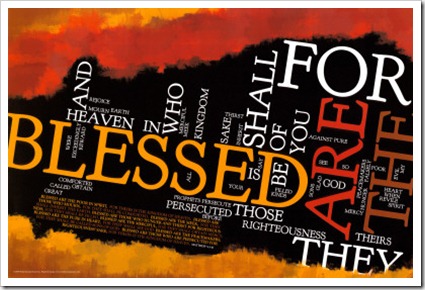[5] “Blessed are the meek, for they shall inherit the earth.
There is a tendency to view meekness as weakness.1 The meek is not someone who capitulates over the face of threats. He doesn’t retreat and act as if it is all a lost cause. We need to re-orient our minds to how the Bible views these characteristics. Remember that the kingdom of God is upside down to those in the world; and in one sense, the way the people of God live is upside down in comparison to how the rest of the world lives. R.J. Rushdoony once wrote that meekness is strength that is tamed. The meek know that their strength comes from Yahweh; he trusts and places his trust in Yahweh to make the world right; he sees Jesus as the ultimate restorer of Israel and the world. The meek has been united to the kingdom of heaven and has a new Lord and Master. He is being built up in the strength and maturity of Christ, the King, but yet this strength is balanced by self-control. The meek does not use his strength to lord it over people or to belittle others inside or outside the kingdom, but he uses his strength as a means to reveal the power of God and his kingdom. Consider Moses. The Bible says he was the meekest man in all the earth (Num. 12:3). Moses was known for his strength. He led an army and shepherded a nation. And when he was accused by others he didn’t say: “Look at me; the all-powerful Moses; the rescuer of Israel, the destroyer of Egyptian forces.” No. Moses restrained his strength and humbled himself before God praying that God would vindicate him in light of his enemies. Are you beginning to see the picture?
The way God honors this controlled strength is by giving the heirs of the kingdom, the earth!
But why would God give us the earth? We are the heirs of the Abrahamic promise. In Romans 4, Paul says that the promise is that we will be the heirs of the world. This earth, this system, this land, this air, everything is given to us; to inherit and to embrace. This is our world, not the devil’s, it is our world given to us by the ruler of the world, Jesus Christ. And the way we begin to claim it and adorn it and fashion it according to the kingdom of heaven is by being meek.
Practically, this means controlling your strength. How often are we guilty of using our strength or our position of authority to deride or to put down another? How often have we used our strength or our position in life to abuse our authority? How do we as parents conquer our children and their hearts? Do we assert our authority or do we win them with the way of meekness? How we assert our authority without abusing our strength is precisely what it means to be meek. And if we are going to rule the earth as God’s army we need to begin by being meek.
Our Lord Jesus did precisely that. He could have come to earth and obliterated all those Pharisees who disagreed with Him. He could have used His angels to bring about perfect justice, but this is not the Christ we know. The Christ we know is the one who became meek for our sakes and because He inherited the earth in His death and resurrection, we too are called to follow in His steps.
[6] “Blessed are those who hunger and thirst for righteousness, for they shall be satisfied.
The fourth beatitude, which concludes this first section, is a call for righteousness. What does it look like to pursue righteousness? It looks like keeping Yahweh’s commandments. After all, Jesus is the one who said that if you love Me keep my commandments. This Beatitude is a call to righteous living.
We should hunger to be more obedient to God. We should hunger to live the gospel of the kingdom. This is what distinguishes the people of the kingdom from those outside of it. But not only is hungering and thirsting for righteousness a call to pursue maturity, it is also a call to hunger and thirst for the establishment of righteousness on earth. We don’t want to see the world spoiled and destroyed. We need to be as hungry and thirsty for righteousness on earth as we are hungry and thirsty for food and drink. We can’t be satisfied with what we have.
In what sense have we lacked hunger and thirst for righteousness? How are we encouraging one another to hunger for righteousness? Is your living such that when others see you they develop a tremendous appetite for righteousness? These are the questions we need to ask in this Advent Season. Advent causes us to consider whether we are starving ourselves and whether we have become purposefully dehydrated. Pursuing the Gospel of righteousness increases our appetite. Our Lord came to be food for the hungry and drink to the thirsty. He calls the weak—the hungry—and heavy-laden—the thirsty—to himself. He is manna and wine. He is God in human flesh. He is God for us—Emmanuel.
As you begin to increase in hunger and thirst for righteousness you will find a deep satisfaction in the life of the kingdom. You will learn that this is the good life; the life worth living; a life of active participation in making earth more and more like heaven.
















[…] is a tendency to view meekness as weakness.1 The meek is not someone who capitulates over the face of threats. He doesn’t retreat and act as […]
[…] Part V, Part IV, Part III, Part II, Part I […]
[…] VI, Part V, Part IV, Part III, Part II, Part […]